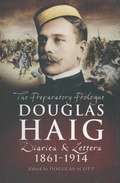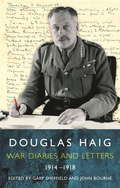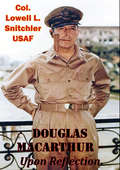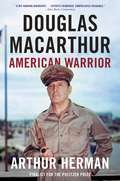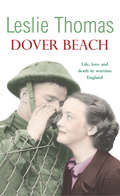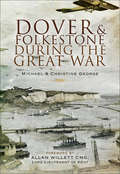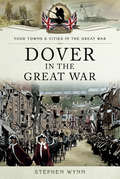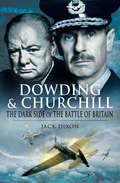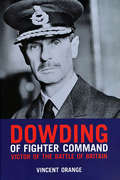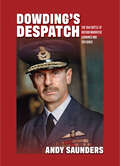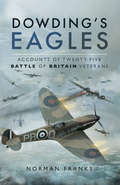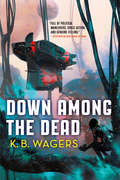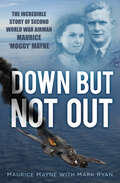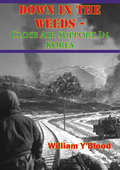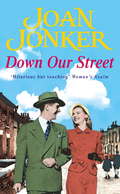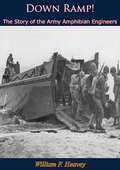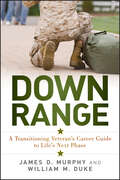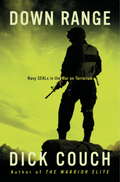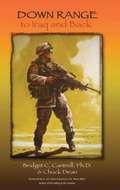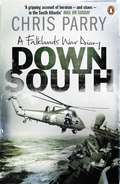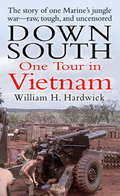- Table View
- List View
Douglas Haig: Diaries & Letters, 1861–1914
by Douglas ScottAs a young officer in the prestigious 21st Lancers (motto 'Death or Glory') Douglas Haig played a leading role in Kitchener's bold expedition which ended in the defeat of the Khalifa of Sudan at Omdurman. He described the action, as he did the whole campaign, vividly in words and diagrams which survived virtually untouched at the family home Bemersyde in the Borders. These letters and diaries allow the reader to trace Haig's career and developing character. What they reveal may well surprise his critics. Field Marshal Lord Haig will remain a hugely controversial figure due to his pre-eminent role during The Great War. He was a hugely popular public figure in the post WW1 years and revered by those who served under him. His death in 1928 was a major occasion for mourning. Only later was he heavily criticised for the slaughter of the trenches.
Douglas Haig: Diaries and Letters 1914-1918
by Dr Gary Sheffield MA FRHistS Dr John BourneThere's a commonly held view that Douglas Haig was a bone-headed, callous butcher, who through his incompetence as commander of the British Army in WWI, killed a generation of young men on the Somme and at Passchendaele. On the other hand, there are those who view Haig as a man who successfully struggled with appalling difficulties to produce an army which took the lead in defeating Germany in 1918.Haig's diaries, hitherto only previously available in bowdlerised form, give the C-in-C's view of Asquith and his successor Lloyd George, of whom he was highly critical. The diaries show him intriguing with the King vs. Lloyd George. Additional are his day-by-day accounts of the key battles of the war, not least the Somme campaign of 1916.
Douglas Haig: Diaries and Letters 1914-1918
by Gary Sheffield John BourneThere's a commonly held view that Douglas Haig was a bone-headed, callous butcher, who through his incompetence as commander of the British Army in WWI, killed a generation of young men on the Somme and at Passchendaele. On the other hand, there are those who view Haig as a man who successfully struggled with appalling difficulties to produce an army which took the lead in defeating Germany in 1918.Haig's diaries, hitherto only previously available in bowdlerised form, give the C-in-C's view of Asquith and his successor Lloyd George, of whom he was highly critical. The diaries show him intriguing with the King vs. Lloyd George. Additional are his day-by-day accounts of the key battles of the war, not least the Somme campaign of 1916.
Douglas MacArthur - Upon Reflection
by Col. Lowell L. Snitchler USAFGeneral-of-the-Army Douglas MacArthur was a complex man whose behaviors seem contradictory on the surface. In fact, he demonstrated an enduring pattern of perceiving, relating to, and thinking about himself and his environment. This consistent personality is evident across a wide range of social and personal contexts and can be traced back to his developmental childhood and adolescent years.This research recounts MacArthur's personality development from childhood, investigates his last military campaign, and, finally, applies the diagnosis of narcissistic personality disorder to the assembled data. Upon reflection, MacArthur's apparent behavioral inconsistencies are reconciled within this clinical framework.Finally, organizational, heuristic and predictive implications are drawn from this research. Academic and operational military uses are suggested.
Douglas MacArthur: American Warrior
by Arthur HermanA new, definitive life of an American icon, the visionary general who led American forces through three wars and foresaw his nation’s great geopolitical shift toward the Pacific Rim—from the Pulitzer Prize finalist and bestselling author of Gandhi & Churchill Douglas MacArthur was arguably the last American public figure to be worshiped unreservedly as a national hero, the last military figure to conjure up the romantic stirrings once evoked by George Armstrong Custer and Robert E. Lee. But he was also one of America’s most divisive figures, a man whose entire career was steeped in controversy. Was he an avatar or an anachronism, a brilliant strategist or a vainglorious mountebank? Drawing on a wealth of new sources, Arthur Herman delivers a powerhouse biography that peels back the layers of myth—both good and bad—and exposes the marrow of the man beneath. MacArthur’s life spans the emergence of the United States Army as a global fighting force. Its history is to a great degree his story. The son of a Civil War hero, he led American troops in three monumental conflicts—World War I, World War II, and the Korean War. Born four years after Little Bighorn, he died just as American forces began deploying in Vietnam. Herman’s magisterial book spans the full arc of MacArthur’s journey, from his elevation to major general at thirty-eight through his tenure as superintendent of West Point, field marshal of the Philippines, supreme ruler of postwar Japan, and beyond. More than any previous biographer, Herman shows how MacArthur’s strategic vision helped shape several decades of U.S. foreign policy. Alone among his peers, he foresaw the shift away from Europe, becoming the prophet of America’s destiny in the Pacific Rim. Here, too, is a vivid portrait of a man whose grandiose vision of his own destiny won him enemies as well as acolytes. MacArthur was one of the first military heroes to cultivate his own public persona—the swashbuckling commander outfitted with Ray-Ban sunglasses, riding crop, and corncob pipe. Repeatedly spared from being killed in battle—his soldiers nicknamed him “Bullet Proof”—he had a strong sense of divine mission. “Mac” was a man possessed, in the words of one of his contemporaries, of a “supreme and almost mystical faith that he could not fail.” Yet when he did, it was on an epic scale. His willingness to defy both civilian and military authority was, Herman shows, a lifelong trait—and it would become his undoing. Tellingly, MacArthur once observed, “Sometimes it is the order one disobeys that makes one famous.” To capture the life of such an outsize figure in one volume is no small achievement. With Douglas MacArthur, Arthur Herman has set a new standard for untangling the legacy of this American legend.
Douglas's Tale of the Peninsula & Waterloo, 1808–1815
by Stanley MonickThese are the memoirs of Sergeant John Dougl as, 3rd Battalion, The Royal Scots, and his experiences as a soldier from 1809-1817. The book provides a narrative of the Peninsular Campaign, with a descriptions of Quatre Bras an d Waterloo '
Dove Song
by Kristine L. FranklinWhen eleven-year-old Bobbie Lynn's father is reported missing in action in Vietnam, she and her thirteen-year-old brother must learn to cope with their own despair, as well as their mother's breakdown.
Dover Beach
by Leslie ThomasSummer 1940. The evacuation of Dunkirk proves that the British can rise to a challenge, even against seemingly insurmountable odds. But now the soldiers walk the streets of Dover, even wandering through Woolworths store, and take weary turns on the town's skating rink.Life, despite the threat of invasion and the reality of bombing, must go on and people must take comfort where they find it. Toby Hendry, a fighter pilot, is awaiting orders when he meets Giselle, a young Frenchwoman who took the chance to flee occupied France with the English troops. Their love affair feels like a summer idyll, but can it withstand the forces of war?Meanwhile, reserve naval commander Paul Instow has been called up to fight in a war for which he feels too old. Distracting him from his worries is Molly, a young Dover prostitute. Their relationship is tender and happy, but is this a love born from desperation or could it be something more permanent?And then there are Harold, Spots and Boot, three boys desperate to fight the German invaders, armed only with catapults and a stolen Bren gun...In Dover Beach Thomas chronicles the lives and loves of ordinary people in besiged Britain during these tense, but curiously elated days.
Dover and Folkestone During the Great War
by Michael George Christine GeorgeFor centuries the south coast of Kent in particular the ports of Dover and Folkestone—have been Englands front line, as her enemies have planned invasions and launched attacks from just across the Channel. During the Great War of 1914–1918 these two towns were again vulnerable to enemy action, and they played a vital role in war effort. As this well-researched and highly illustrated book shows, the people of the Channel Ports suffered from bombardment by air and sea. They also played a significant role in the experience of the men who fought in the Great War. For the humble soldier, this stretch of coastline had a personal meaning—it represented Blighty. It might be the last thing the departing Tommy would see of his country and, for a soldier returning wounded or on leave, the White Cliffs on the horizon were his first glimpse of home.
Dover in the Great War (Your Towns & Cities in the Great War)
by Stephen WynnSituated on the south coast of England, geographically and strategically, Dover more than played its part in the First World War. It was from its harbor that the many vessels of the Dover Patrol set about preventing German ships from using the English Channel. It was undoubtedly one of the most important Royal Naval units that Britain had during the First World War.Because of its important defensive roll, Dover was identified as a legitimate and relevant target by the German authorities. As a result, German Zeppelin's and Gotha aircraft subjected Dover to 113 aerial attacks, dropping 185 bombs in the process. The first of these raids took place on Christmas Eve, 1914; this was also the first time a German bomb had been dropped on British soil. The last raid was on 24 August 1918, in which twenty adults and three children were killed.The local residents who, for whatever reason, were unable to enlist in the military during the war, but who still felt the desire and obligation to serve their King and country, were able to do so in organizations such as the Dover Volunteer Training Corps. Most towns had similar units, and their members carried out some sterling work on the Home Front.By the end of the war, Dover and its people had sustained through testing and difficult times. Like every community throughout the nation, they had paid a heavy price. They had been as close to the war as it was possible to be, without actually being on the Front Line. Ships had sailed from its harbour to engage the enemy, and wounded soldiers had returned to the same harbour. Its men had gone of to fight in the war and, sadly, 721 of them never came back.
Dowding & Churchill: The Dark Side of the Battle of Britain
by Jack DixonA WWII historian shines a light on an unsung hero of the Battle of Britain and reveals the conspiracy that led to his undignified dismissal.From 1936 to 1940, Air Chief Marshal Sir Hugh Dowding built Britain’s cutting edge defensive force, Fighter Command. Thanks to his foresight, Fighter Command was the only military arm prepared for battle when war was declared against Germany. Dowding’s leadership of Fighter Command was crucial to achieving victory in the Battle of Britain—one of the decisive battles of Western Civilization.Though the importance of the Battle of Britain was recognized at the time, Dowding was relieved of his command shortly afterward—and shuffled into retirement without recognition. This book reveals that this was the result of a shabby conspiracy by fellow officers. In March 1941, the Air Ministry published a brief account of the battle that made no mention of Dowding.Churchill was furiously indignant. But in November 1940 he had acquiesced in Dowding’s removal. Why? And what are the factors that led to Dowding’s dismissal in the first place? In this thought-provoking and authoritative book Jack Dixon answers these questions and explains Dowding’s true greatness.
Dowding of Fighter Command: Victor of the Battle of Britain
by Vincent OrangeAn extensive biography of the life and distinguished military career of the Scottish air chief marshal. Making full use of archival sources, studies by other scholars, and information provided by family members, Vincent Orange has completed the first biography of Air Chief Marshal Sir Hugh Dowding to cover his entire life. Soldier, pilot, wireless pioneer, squadron commander, spiritualist, champion skier, &“Stuffy&” Dowding is perhaps best known as the creator of the first radar-based air defense system and his no less remarkable management of such throughout the Battle of Britain. Dowding served in &“delightful and dangerous Iraq,&” helped to pacify unrest in the Holy Land, was involved in the R.101 airship disaster, and oversaw the creation of Britain&’s first eight-gun monoplanes, the Hurricane and Spitfire. Controversially dismissed from Fighter Command and refused the R.A.F.&’s highest rank, he nevertheless became the first airman elevated to the peerage since Trenchard. Westminster Abbey was packed for his memorial service in March 1970 with more than 46 air marshals in attendance; and in 1988, H.M. the Queen Mother unveiled a statue in his honor. With his expert eye, respected historian Orange has analyzed and evaluated every episode of Dowding&’s exceptional career to produce the definitive biography.
Dowding's Despatch: The 1941 Battle of Britain Narrative Examined and Explained
by Andy SaundersIn September 1946, the London Gazette published a despatch from Air Chief Marshal Sir Hugh C T Dowding that was titled simply: The Battle of Britain. Written and submitted to the Air Ministry in 1941, this document became the very framework for the accepted Battle of Britain narrative which has been established across the following eighty years. Set out by the leader of the ‘Few’ himself, its authoritative tone could surely be considered a definitive outline of the battle, how it was fought and the eventual outcome. It even retrospectively set the dates for the commencement and conclusion of the campaign. In this work, Andy Saunders takes a critical look at Dowding’s despatch and analyses the facts and details contained in that important document. He also puts ‘flesh on the bones’ of the matters that the former commander-in-chief of RAF Fighter Command outlines, adding intriguing historical detail and perspective to the 1946 publication. Additionally, Andy looks at the behind-the-scenes machinations at the highest levels of government and Air Ministry before the despatch finally saw the light of day. As a historical document, Dowding’s London Gazette despatch is worthy of the critical analysis and factual expansion which the author provides in what is a uniquely different look at the Battle of Britain, with illustrations throughout.
Dowding's Eagles: Accounts of Twenty-Five Battle of Britain Veterans
by Norman FranksTwenty-five veteran airmen share stories of their experiences during World War II’s Battle of Britain in this unique history.The Battle of Britain fought by The Few, as Churchill famously called them, will remain a legendary feat of arms for centuries to come. Sadly, there remain only a handful today who can tell their stories so this collection of personal accounts is extremely timely.The Author has over the years gathered the stories of twenty-five survivors and in Dowding’s Eagles he brings these stirring stories together. Each account describes the actions and impressions of the individuals who fought lonely battles against a numerically superior enemy. The odds were stacked against The Few.Over 500 pilots were killed in action during the summer of 1940, and this book is as much about those who gave their lives for their country as those who risked everything but managed to survive.Together with photographs of the men and their aircraft, this is an inspiring book.
Down Among The Dead: The Farian War, Book 2 (The Farian War Trilogy)
by K. B. WagersGunrunner empress Hail Bristol must navigate alien politics and deadly plots to prevent an interspecies war, in this second novel in the Farian War space opera trilogy.In a surprise attack that killed many of her dearest subjects, Hail Bristol, empress of Indrana, has been captured by the Shen -- the most ruthless and fearsome aliens humanity has ever encountered. As she plots her escape, the centuries-long war between her captors and the Farians, their mortal enemies and Indrana's oldest allies, finally comes to a head.When her captors reveal a shocking vision of the future, Hail must make the unexpectedly difficult decision she's been avoiding: whether to back the Shen or the Farians. Staying neutral is no longer an option. Will Hail fight? Or will she fall?Praise for the Farian War trilogy:'An exciting dose of space opera and political intrigue peppered with hard choices. Highly recommended.' Booklist'Action and emotion-packed, folding political tension, personal relationships, and trauma into a vivid space opera that does not pull any punches.' Library Journal 'A rare balance of action . . . tension, and quiet moments, keeping pages turning while deepening the portraits of Hail and the friends and foes around her.' Publishers Weekly'Perfectly executed . . . Science fiction with brains, and a buckload of heart.' The Eloquent Page
Down But Not Out: The Incredible Story of Second World War Airman Maurice 'Moggy' Mayne
by Mark Ryan Maurice MayneMaurice ‘Moggy’ Mayne was a cricket-loving air gunner in the Second World War, with a pretty girlfriend back home in rural England. His turret was in a Bristol Beaufort and his pilot had to fly with almost suicidal bravery at giant German warships before releasing the torpedo. No wonder Moggy’s first pilot cracked up and his second liked to drink. When he was shot down, Moggy miraculously survived – unlike his best friend Stan. Moggy was sent to Stalag Luft VIIIB, an infamous German POW camp near the Polish border, where he was badly treated. Fearing losing his beloved girlfriend Sylvia forever, and risking recapture and execution, he saw the chance to escape alone, thus beginning an epic journey through Nazi-occupied Germany. As the Gestapo shot other escaped British servicemen, Moggy Mayne came agonisingly close to lasting freedom. Instead, as the war neared its end, he had to face the horrors of the ‘long march’ west – and he felt his life slipping away. Would he ever see his Sylvia again?
Down In The Weeds - Close Air Support In Korea
by William Y’bloodBefore the Korean War, the primary mission of Lt. Gen. George E. Stratemeyer's Far East Air Forces was air defense of the Japanese homeland. Most of the aircraft constituting Stratemeyer's inventory were interceptors, not designed for the type of combat that would be required now that the United States was joining in the UN effort to end the war in Korea. The Joint Army/USAAF doctrine of 1946, known as Field Manual 31-35, Air Ground Operations, was also considered outdated in the present circumstance. A new approach to warfighting had to be developed in response to the strong influence of General Douglas MacArthur and other of his air officers in the Army-dominated General Headquarters Far East Command. Close air support of the ground forces as provided by Fifth Air Force came at some cost, and tempers flared in the process, but the air commanders in Korea never deprived the ground commanders of close air support if it was needed. Indeed, without the close air support provided to the airmen, the ground campaign would have been a much more bloody and difficult affair than it was.
Down Our Street: Friendship, family and love collide in this wartime saga (Molly and Nellie series, Book 4)
by Joan JonkerWith a double wedding on the cards, Liverpool's best-loved neighbours plan for an unforgettable day. In Down Our Street, Joan Jonker brings us another instalment of her hugely popular Molly and Nellie series, as the two friends get up to more mischief in their beloved Liverpool. Perfect for fans of Katie Flynn and Lindsey Hutchinson.'Hilarious but touching' - Woman's RealmThe Second World War is finally over and best friends Molly Bennett and Nellie McDonough are bursting with happiness. Their beloved sons are coming home at last and their eldest children are planning to marry each other. When a double wedding is announced, Molly is determined to give her two beautiful daughters a day to remember for the rest of their lives. Meanwhile Nellie's daughter Lily has a boyfriend whom no one likes. When he brings trouble to their door, Nellie's friends in the street are ready to face it. And there's a handsome young chap just waiting in the wings for Lily... What readers are saying about Down Our Street: 'This book is like a breath of fresh air, never have I laughed so much and also cried at the antics of Molly and Nellie''A lovely story that will make you laugh out loud and shed a tear. A story that will touch every emotion. It's so well written that it makes you feel a part of the families'
Down Ramp!: The Story of the Army Amphibian Engineers
by William F. HeaveyThis is the story of the U.S. Army Amphibian Engineers, which saw significant (and dangerous) action both in the European and Pacific theaters during World War II. They were charged with the organization and supervision of crossing and landing parties, forming beachheads for invading troops. Efficient and courageous, they quickly became key elements in the Allies' fight to gain ground and maintain supply lines. These soldiers were frontline heroes, even if they didn't always make the front-page headlines. Down Ramp! keeps the memory of their history and brave service alive.-Print ed.Landing an army on a hostile shore has long been regarded as one of the most difficult of all tactical operations. Even if the expanse of water to be crossed is only a river and not an ocean, history has proved the danger and costliness of such operations.Yet we entered World War II with stretches of water varying from the 50-mile turbulent English Channel to the 5,000-mile expanse of the Pacific separating us from our mortal enemies. We had to cross these waters and make successful landings on enemy-held shores to get at our enemies. To all military students except a few extremists it was obvious that we would never win until our infantry crossed those waters to crush the enemy’s heart. Air attacks without an atomic bomb or a naval blockade, no matter how stringent, could never do that alone.As has always been its tradition in new developments, the Corps of Engineers made vital contributions to this amphibious part of World War II. This book presents the accomplishments and operations of the Amphibian Engineers in World War II. It is the story of the six brigades and the two separate battalions the Corps of Engineers launched to help win the Victory.
Down Range: A Transitioning Veteran's Career Guide to Life's Next Phase
by James D. Murphy William M. Duke<p>Written by veterans who have successfully made the transition, <i>Down Range</i> offers career planning guidance to U.S. military veterans coming off active duty. This is NOT simply a guide to transitioning from the military to the civilian world. This is NOT a guide to getting a job. This book IS a guide to developing a post-military career, not just for the first few days, weeks, or months after active duty, but for the rest of your employed life. <p>This simple and effective planning process has been taught to more than 1 million business executives in companies all over the world. <p> <li>Explains how to build an adaptable long-range career plan called a Career High Definition Destination (HDD), across a spectrum of seven key areas <li>Shows how business differs from military service, how to identify the resources needed to achieve the Career HDD, and how to develop strategic and tactical courses of action that drive you to executing towards your Career HDD on a consistent basis <li>Author James Murphy is founder of Afterburner Inc. and is currently working with the U.S. Army at the highest levels to develop a transition program for the estimated 1.5 million veterans who will transition from active duty service to civilian careers by the year 2020 <p> <p>This book challenges veterans to change their mind-set and understand just how different the "wilderness" of civilian employment is from military experience. Down Range provides an appreciation for what's important to a business, helping you to become a valuable asset throughout your career.</p>
Down Range: Navy SEALs in the War on Terrorism
by Dick CouchIn America's battle against al-Qaeda and their allies, the goal of the Navy SEALs is to be the best guns in the fight--stealthy, effective, professional, and lethal. Here for the first time is a SEAL insider's battle history of these Special Operations warriors in the war on terrorism. "Down range" is what SEALs in Afghanistan and Iraq call their area of operations. In this new mode of warfare, "down range" can refer to anything from tracking roving bands of al-Qaeda on a remote mountain trail in Afghanistan to taking down an armed compound in Tikrit and rousting holdouts from Saddam Hussein's regime. It could mean interdicting insurgents smuggling car-bomb explosives over the Iraqi-Syrian border or silently boarding a freighter on the high seas at night to enforce an embargo. In other words, "down range" could be anywhere, anytime, under any conditions. In Down Range, author Dick Couch, himself a former Navy SEAL and CIA case officer, uses his unprecedented access to bring the reader firsthand accounts from the warriors in combat during key missions in Afghanistan and Iraq. Couch creates a pulse-pounding, detailed narrative of the definitive engagements of this war, while painting an unusually intimate portrait of these warriors in the field. The performance of the SEALs in difficult, changing environments--in the heat of the Afghan desert, in the snow-packed Hindu Kush, on the high seas, and in the urban chaos of Baghdad--has been nothing short of extraordinary. The SEALs, coordinating with other American forces, the CIA, and foreign special operations units like the Polish GROM, have once more shown their genius for improvisation and capacity for courageous action in leading the fight against this new and vicious enemy. The first battle history of its kind, Down Range is a riveting close-up of some of America's finest warriors in action against a deadly foe. Also available as an eBook From the Hardcover edition.
Down Range: To Iraq and Back
by Bridget C. Cantrell Chuck Dean<p>As soldiers, we have spent countless years learning to survive the actual battle. Endless days on the firing range; countless hours in battle drills; months in combat learning the "ropes"; physical fitness training every day...all of these were dedicated to ensuring your survival and victory at the moment of truth. Now, it is time to dedicate some time to surviving when it is over. <p>PTSD is sometimes called "The gift that keeps on giving." If you die, that is not contagious--but if you live, and come out of the experience with a load of mental baggage, then your loved ones will most likely share in your struggles as well. <p>Reading this book ahead of time can be a form of inoculation, giving you insight that will help keep your combat reactions in perspective, and help you understand what is happening to your mind and body after wartime experiences. Just as we can equip ourselves to physically survive combat, we can also prepare to mentally survive the aftermath. This book is yet another tool in that equipping process.</p>
Down South: A Falklands War Diary
by Chris ParryDown South by Chris Parry - one man's astonishing diary of war in the Falklands'A gripping account of heroism - and chaos - in the South Atlantic' Mail on Sunday'Compelling, gripping. A vividly written, thought-provoking and engaging account' The TimesIn 1982 Lieutenant Chris Parry sailed aboard destroyer HMS Antrim to liberate the Argentine-occupied Falkland Islands. Parry and his crew, in their Wessex helicopter, were soon launched into action rescuing an SAS party stuck on a glacier in gales that had already downed two others. Soon after they single-handedly pursued and fatally wounded a submarine before taking part in terrifying but crucial drop landings under heavy fire. Down South is a hands on, day-by-day account of war fought in the most appalling conditions by men whose grit and fighting spirit overcame all obstacles.This important and extraordinary book of recent history will be enjoyed by readers of Antony Beevor and Max Hastings.'Gripping. A graphic description of just how they pulled off a real-life Mission Impossible' Daily Express 'Excellent. A fascinating war diary' Daily Telegraph'Vivid and insightful. Parry excels in revealing the day-to-day challenges of fighting a campaign in hostile surroundings' Financial Times'A truly gripping historical account' Niall Ferguson 'A priceless contribution to military history. Riveting' Literary ReviewChris Parry joined the Royal Navy after university and then became an Observer in the Fleet Air Arm in 1979. After the Falklands War he had a successful career in the navy, and on promotion to Rear Admiral in 2005 he became the Ministry of Defence's Director of Developments, Concepts and Doctrines. He was appointed a CBE in 2004. Now retired from the armed services, he heads a company which specializes in geo-strategic forecasting.
Down South: One Tour in Vietnam
by William H. Hardwick"I was always happy to see first light. By first light it was over ... for a while." -from Down South. There were a lot of ways to get killed in Vietnam. You could get "zapped," "dinged," "burned," "popped," "smoked," or "wasted." Marine 2nd Lt. William H. Hardwick was familiar with all of them because, unlike most USMC artillery officers--who waged their war from bunkers inside protected compounds--Hardwick as a forward observer fought alongside rifle companies and lived like a grunt for most of his thirteen-month tour. In Okinawa, Vietnam was referred to as "Down South," and in 1968, "Down South" was a bad place to be. Hardwick did it all--walking point, springing ambushes, capturing prisoners, and spending months in the bush surrounded by crack NVA troops. At times the attacking enemy was so close, Hardwick had to call in air strikes almost on top of the Marines themselves just so they could survive. William Hardwick volunteered to fight as one of the few, the proud, the Marines.
